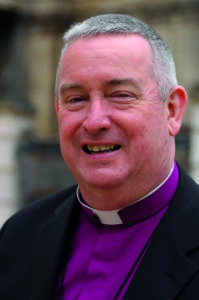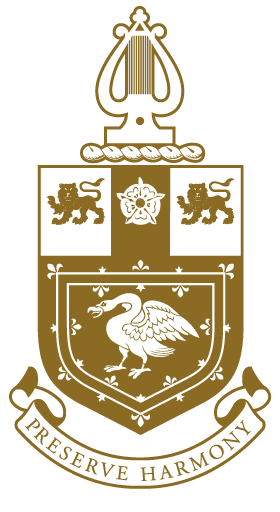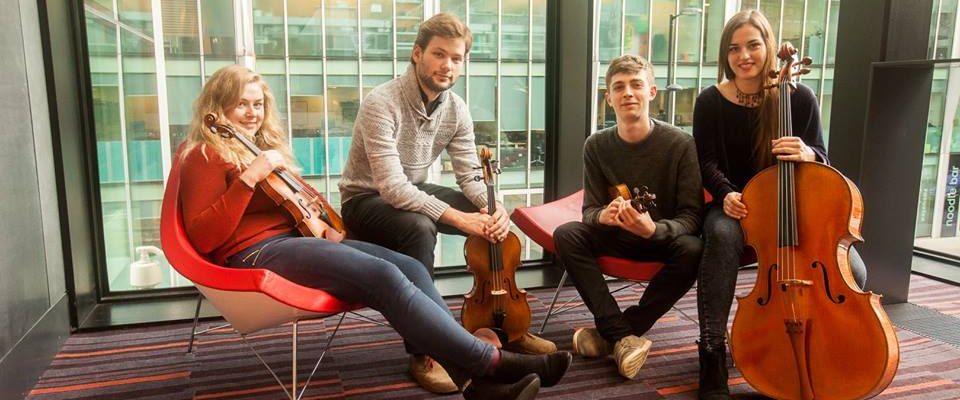Our New Master: Rt Revd Graeme Knowles CVO
 Nunquam Sponte Subvestitus or Never Knowingly Underdressed!
Nunquam Sponte Subvestitus or Never Knowingly Underdressed!
I well remember climbing the pulpit steps at St Paul’s for my first ever United Guilds Service. I had been warned that this was an important sermon and that my ‘audience’ were hardened sermon tasters. I gazed down at the packed cathedral, ablaze with the scarlet of the aldermen, the glitter of the Lord Mayor’s party and the sea of bling and fur that stretched out down the nave where the Livery sat. Taking a very deep breath, I began by saying that my favourite films were historical costume dramas….and that it would appear that I had just wandered on to the set for one such film. Luckily this high risk start was greeted with a roar of laughter. My ministry in the City was safe.
Never would I have believed as I came down the steps from the pulpit that I, in turn, would be asked to don the robes of a Master of a Livery Company and that that company would be the Musicians.
My musical credentials are those of the amateur. I was put into the choir of Dunstable Priory in Bedfordshire when I was seven years old. The Rector wanted cathedral quality music, and so had appointed a deputy from Ely cathedral as organist. We sang three choral services every Sunday and up to eight weddings every Saturday, a lucrative trade at half-a-crown a wedding (but I never want to hear Crimond again). At Grammar School I was fortunate to arrive just as a music department was being established. We sang plenty of Britten, including a performance of The Golden Vanity, for which I also painted the scenery (should I not also be a Painter Stainer?). The highlight of my school singing career was to sing the part of the Robin in Elizabeth Maconchy’s The Birds, a part which required me to stammer musically. Once again, I think my stunning portrayal of two flamingos flying across the backdrop scenery probably outshone my musical achievement.
While I was training for the priesthood at Kings College London, my love for opera grew as well as my interest in the Victorian and Edwardian ballad repertoire. I think the group with which I sang bored many an audience silly, but there was nothing to compare with discovering the corner of a second hand bookshop where the sheet music was stored. What treasures could be found there. Who can resist the drama of Watchman, what of the night? or Nirvana? There was never a dry eye in the house by the end of my rendition of Love, could I only tell thee.
My ministry has taken me to four musical foundations, Leeds Parish Church, Portsmouth Cathedral, Carlisle Cathedral and lastly St Paul’s.
At Leeds and Portsmouth I was Precentor and at Carlisle I doubled as dean and precentor. There, I queued with the choristers for my singing lessons, to be told by the teacher ‘We must do something about your awful southern vowels!’ On the Isle of Man, where I was bishop, I also discovered a rich musical life, which boasted a very high quality competitive music festival called The Guild. There was no higher compliment that could be paid to a person on the Isle of Man other than to whisper ‘He/She won the Cleveland Medal, you know’ – the gold medal given to the best singer each year. And yes, it is Cleveland, Ohio, which presents the medal.
Retirement has brought Susan, my wife, and me to another cathedral town. We live in Bury St Edmunds in Suffolk, enjoying the rich musical life of the county and the town.
At the beginning of each part of my ministry I have been interviewed by the press. I have come to dread the inevitable question ‘What are your plans for the future here?’ I have resisted the temptation to say ‘I haven’t the faintest idea…
I have just arrived’. It is a foolish person who comes to a task with set ideas before discovering what life is actually like in the role. Masters are often asked the same question ‘What are your plans for your year?’ Since being elected to the Court of the Company, I have been privileged to see a succession of Masters set the highest of standards to follow. I was pleased to be asked to review the role of the Clerk, which has informed the way in which the work of the office has developed. My task therefore, as the next Master of the Company, is one of stewardship, preserving that which is good, bringing a critical eye to that which needs to be reformed and enabling that to happen.
We are at a point of consolidation in the history of the Company. We are attracting a steady flow of new Freemen. Our Young Artists’ work flourishes. We have a strong Court, with an ever increasing skill base. We are supported by a gifted and committed Clerk and office team. As the City comes back to life, and as the Livery in general responds to the challenge of how it can serve the City in its desire to retain and expand its influence, we have a vital part to play. Our Company is lucky: we do what the label says. We exist for the cause of Music and Musicians. We are there to promote the place of music in our lives. In a world of increasing discord, we can offer the balm of harmony through music. So, my answer to the question ‘What are you going to do in your year as Master?’ is quite simple. I will be the steward of the extraordinary inheritance which is ours as the Worshipful Company of Musicians; I will take every opportunity to publicise the work we do; I will look to build on the achievements of the recent past; and, above all, I will try to be worthy of the trust that has been placed on me by the Court in electing me as Master. But this has to be a team effort, and so I look forward to working with all those connected with the Company to ensure a vibrant and healthy future.
By: The Master GRAEME KNOWLES CVO





